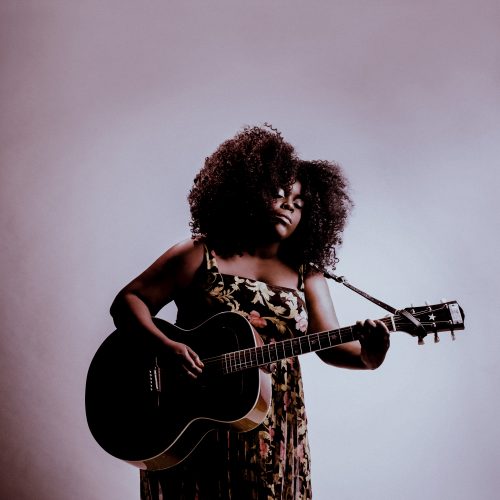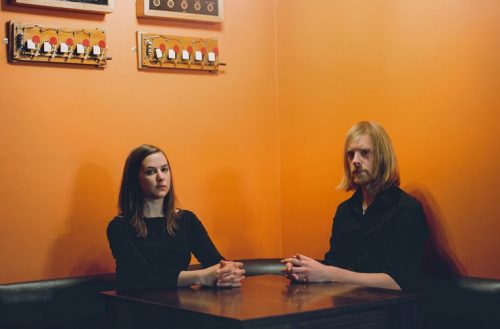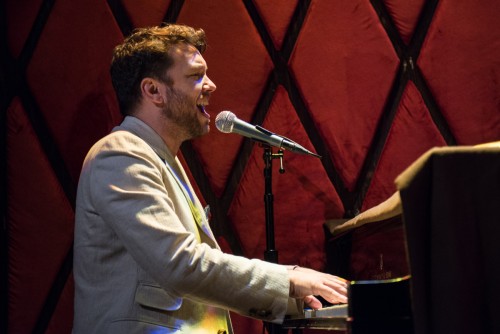Yola has performed with Jools Holland, crossed paths with James Brown and even done a stint with the band Massive Attack. She counts Dan Auerbach of The Black Keys as a musical partner, and NPR and Rolling Stone include her on artist-to-watch lists. And the British singer-songwriter hasn’t even released an album yet.
“I’m kind of in this state of anticipation,” says Yola, on the phone from AmericanaFest UK.
Her debut album, the deep and soulful “Walk Through Fire,” sees the light of day Feb. 22 on Auerbach’s Easy Eye Sound. Banned from making music as a youngster, surviving a fire that destroyed her home and briefly homeless, Yola has seemingly lived a few lifetimes, and it all fuels the music on the album.
Before the record release, she’ll make her NYC debut at Rockwood Stage 2 on Wednesday, Feb. 6, at 7 p.m. We chatted with Yola about her remarkable backstory, working with Auerbach and the lead-up to the release of “Walk Through Fire.”
Tell me about being banned from making music when you were young.
It was a pretty hard ban. At first it was a suggestion. And as I got older, because I kept with insisting that I was going to do it, first it was like a soft ban because I was so young I couldn’t possibly have been serious, but year after year I’m coming back saying the same damn thing, so then it became like a blanket ban: You cannot pursue this as a profession. And the context is poverty. I think what we hear increasingly is a lot of trust fund kids making music, kids that can afford to go to super-expensive conservatoires or like rock schools that cost 5, 10 or 15 grand a term, and it starts to become the kind of purview of the privileged, and I think where I’m coming from I didn’t have any opportunity to do anything luxurious, like the kind of philosophy or classic degree where you don’t know if you’re going to get a job, and music is kind of under that umbrella of things that are so hard to guarantee that it’s dangerous if you’re poor because there is no kind of safety net, there is no daddy’s bank account situation. So I think the context was, “We can’t afford dreams. You need to go and make serious money to get yourself out of this situation.” We didn’t have anything, and what we did manage to get was hard-won. My mom just wanted me to do well and just not struggle like she struggled.
When did you start writing?
I must’ve been about 5 or 6. It was always a thing. And I collaborated with some local DJ, producer people when I was 16 and they had a small label and that was my first official release that I had to sign off on. From that point onward I started, tentatively, as a top-line writer and sometimes session vocalist, basically anyone who was willing to do some music, because I was banned from it, so I had to do it as much as possible and move it on as quickly as possible. I was hungry, or as we say nowadays, thirsty as hell, for gigs, for anything, and also I think the music I wanted to do for myself, there wasn’t anyone really doing that, so it took me a little while to find people and then convince them that they had the guts to do it in the first place. I think we slowly coaxed ourselves toward that, and all that time working with different bands and still kind of top-lining and doing a gazillion different jobs from teaching disabled kids and washing dishes and you name it, just trying to keep the hustle alive.
What did Dan Auerbach, who produced the album and co-wrote with you, bring to the process?
I think he brings vision. Like his specialist subject is if you play a chord or you sing a line that he can paint the aesthetic, he seems almost in a cinematic vision. I certainly hear that with the song on the album “It Ain’t Easier.” In the chorus you have like this lovely piano part and he really pokes that part out in the mix, in the mix it sticks out a lot more than the other instrumentation just in that moment because it’s so gently done, and I think it’s really important for someone to understand the drama of a song and pull that out as a producer.
Tell me about your experience opening for James Brown.
That was probably one of the weirdest gigs of my life. Amazing and legitimately weird. I had seen him backstage in a white robe and slippers and the curlers in, and I looked out my trailer and was like, am I seeing what I’m seeing? Someone spiked my tea, I must be high. But that was him, shuffling around in his slippers. And he stopped and had a little chat and I had to ask him to repeat everything he said at least once. It was unreal.
There’s a lot of buzz leading up to the album release. How do you feel about it?
I’m kind of in this state of anticipation. Like, everything is pointing towards just having a really great..it feels good, it feels like a good time and I really believe in the record and think it’s the record thing for now and where I am and what I want to be doing creatively, I don’t feel hemmed in genre-wise even. So that’s what makes me feel really positive. But at the same time I have no answers yet because this damn thing isn’t out. It’s all the setup, and the setup goes on for such a long time you have no idea how things are going to work out. I wouldn’t say that nervous is the word, I’d definitely say it’s in this constant state of anticipation, waiting for the cliffhanger, you’re waiting for the end of the show, hanging on to the next episode of the show, and that’s what I’m doing right now.
Photos by Alysse Gafkjen




Leave a Reply